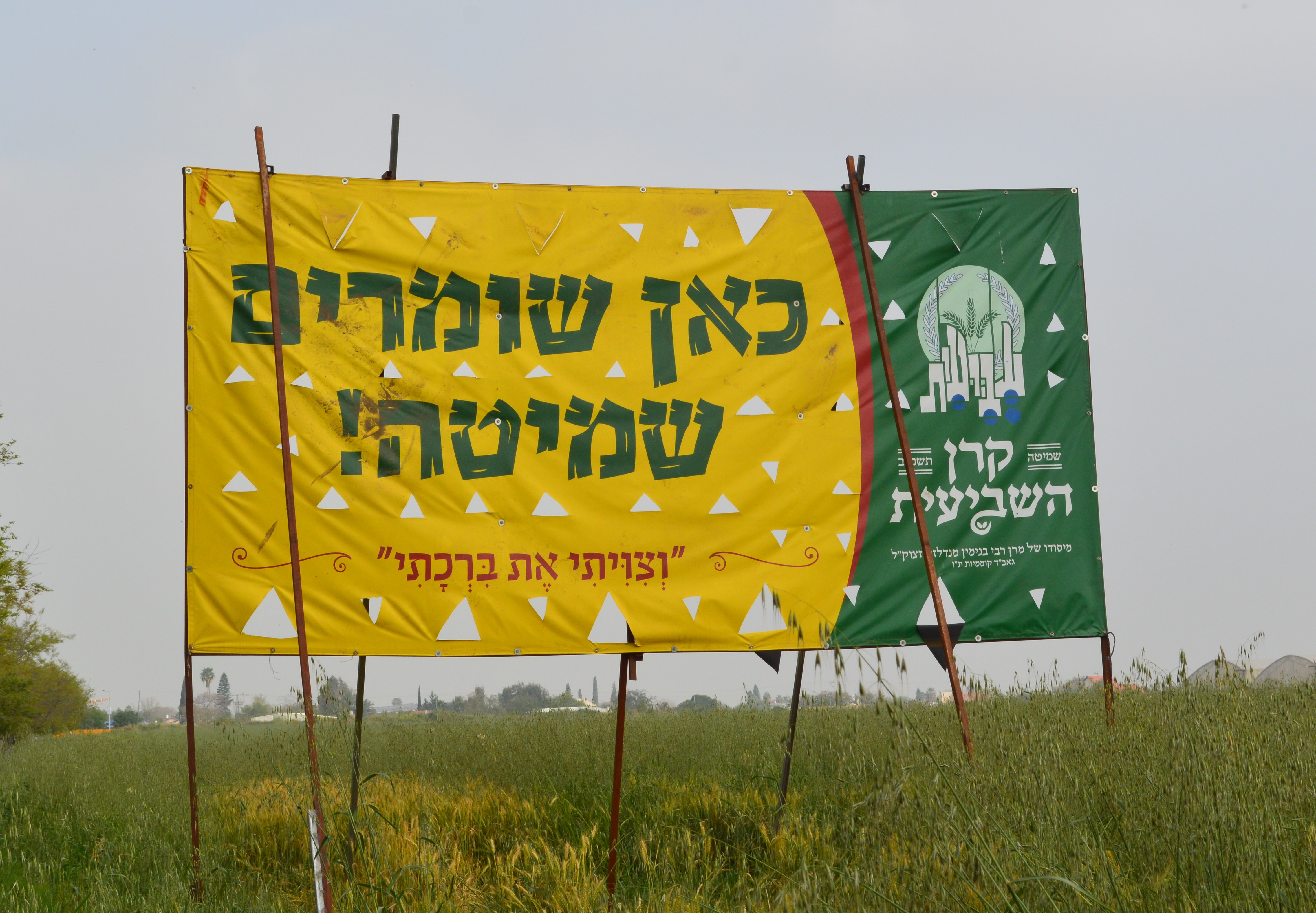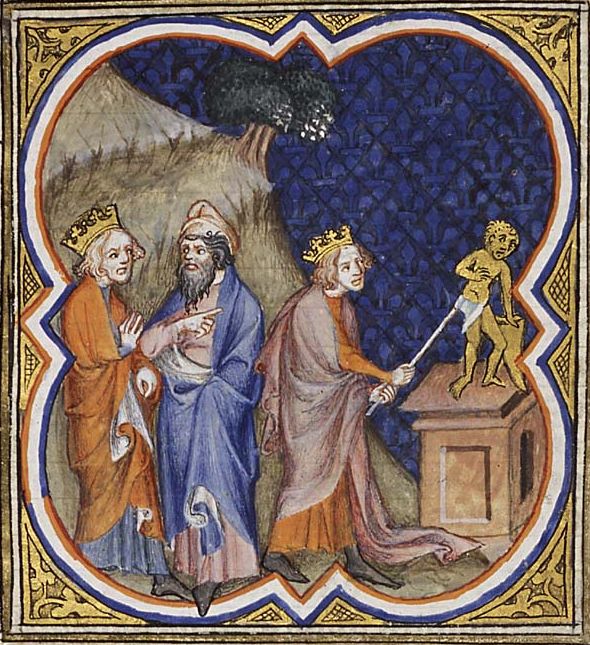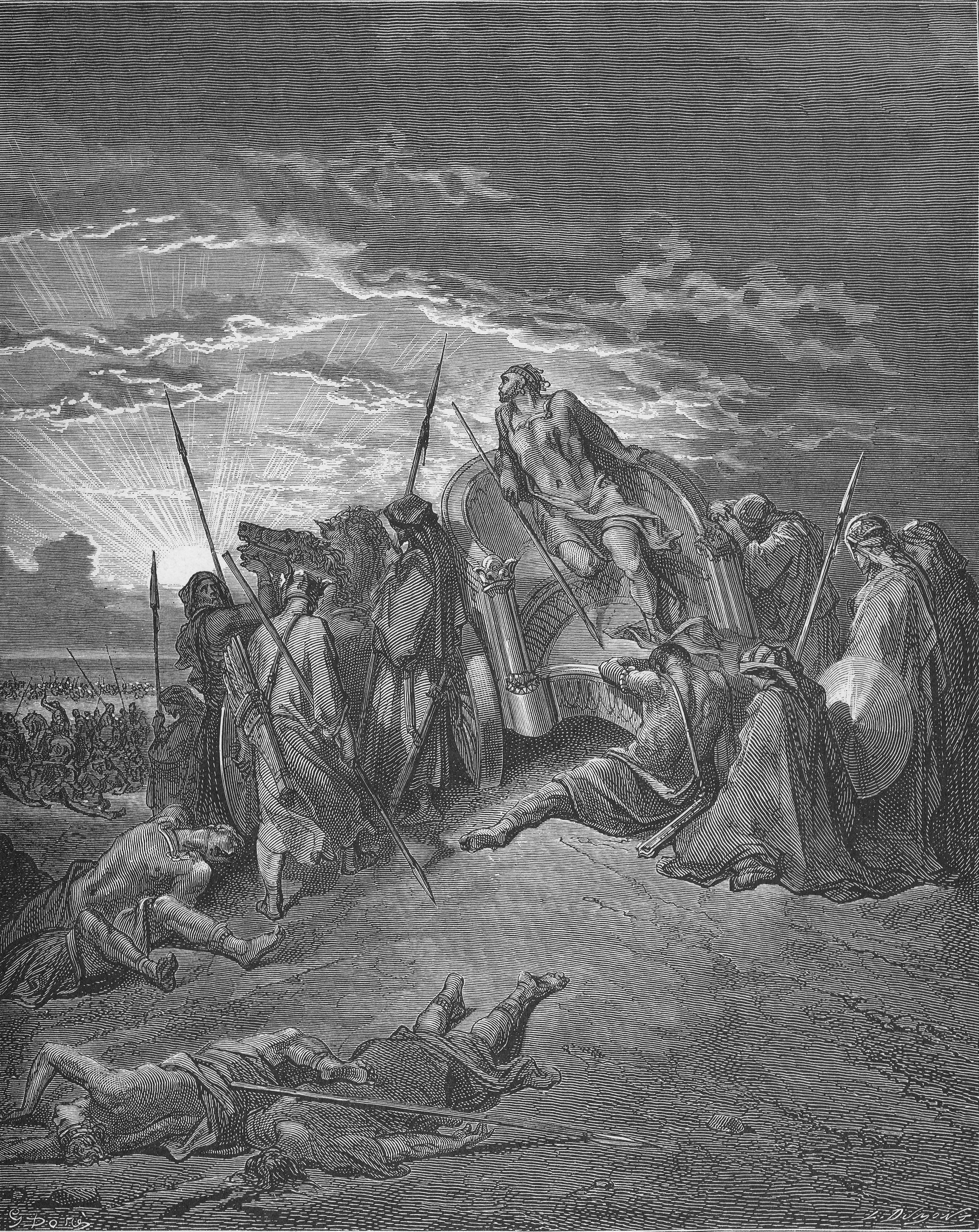|
Jehoshaphat
Jehoshaphat (; alternatively spelled Jehosaphat, Josaphat, or Yehoshafat; ; el, Ἰωσαφάτ, Iosafát; la, Josaphat), according to 1 Kings 22:41, was the son of Asa, and the fourth king of the Kingdom of Judah, in succession to his father. His children included Jehoram, who succeeded him as king. His mother was Azubah. Historically, his name has sometimes been connected with the Valley of Josaphat. Reign 2 Chronicles chapters 17 to 21 are devoted to the reign of Jehoshaphat. 1 Kings 15:24 mentions him as successor to Asa, and 1 Kings 22:1-50 summarizes the events of his life. The Jerusalem Bible states that "the Chronicler sees Asa as a type of the peaceful, Jehoshaphat of the strong king". According to these passages, Jehoshaphat ascended the throne at the age of thirty-five and reigned for twenty-five years. He "walked in the ways" of his father or ancestor, King David. He spent the first years of his reign fortifying his kingdom against the Kingdom of Israel. H ... [...More Info...] [...Related Items...] OR: [Wikipedia] [Google] [Baidu] |
Jehoram Of Judah
Jehoram of Judah (, ) or Joram (; el, Ἰωράμ, Ioram; la, Joram or Ioram), was the fifth king of Judah, and the son of king Jehoshaphat. Jehoram rose to the throne at the age of 32 and reigned for 8 years (, ), although he was ill during his last two years (). Name The name ''Jehoram'' is confusing in the biblical account. The author of Kings speaks of both Jehoram of Israel and Jehoram of Judah in the same passage, and both reigned at the same time. Both Jehorams are also referred to as Joram, even in the same translation in the same breath. For example, reads: :5 He walked also after their counsel, and went with Jehoram the son of Ahab king of Israel to war against Hazael king of Aram at Ramoth-gilead; and the Arameans wounded Joram. :6 And he returned to be healed in Jezreel of the wounds which they had given him at Ramah, when he fought against Hazael king of Aram. And Ahaziah the son of Jehoram king of Judah went down to see Jehoram the son of Ahab in Jezreel, becaus ... [...More Info...] [...Related Items...] OR: [Wikipedia] [Google] [Baidu] |
Shmita
The sabbath year (shmita; he, שמיטה, literally "release"), also called the sabbatical year or ''shǝvi'it'' (, literally "seventh"), or "Sabbath of The Land", is the seventh year of the seven-year agricultural cycle mandated by the Torah in the Land of Israel and is observed in Judaism. During ''shmita'', the land is left to lie fallow and all agricultural activity, including plowing, planting, pruning and harvesting, is forbidden by ''halakha'' (Jewish law). Other cultivation techniques (such as watering, fertilizing, weeding, spraying, trimming and mowing) may be performed as a preventive measure only, not to improve the growth of trees or other plants. Additionally, any fruits or herbs which grow of their own accord and where no watch is kept over them are deemed ''hefker'' (ownerless) and may be picked by anyone. A variety of laws also apply to the sale, consumption and disposal of ''shmita'' produce. All debts, except those of foreigners, were to be remitted. Chapt ... [...More Info...] [...Related Items...] OR: [Wikipedia] [Google] [Baidu] |
Asa Of Judah
Asa (; el, Ασά; la, Asa) was, according to the Hebrew Bible, the third king of the Kingdom of Judah and the fifth king of the House of David. The Hebrew Bible gives the period of his reign between 40–41 years. His reign is dated between 913–910 BC to 873–869 BC. He was succeeded by Jehoshaphat, his son (by Azubah). According to Thiele's chronology, when Asa became very ill, he made Jehoshaphat coregent. Asa died two years into the coregency. Asa was zealous in maintaining the traditional worship of God, and in rooting out idolatry, with its accompanying immoralities. After concluding a battle with Zerah of Ethiopia in the 10th year of his reign, there was peace in Judah () until the 36th year of Asa's reign (). In his 36th year he was confronted by Baasha, king of Israel. He formed an alliance with Ben-Hadad I, king of Aram Damascus, and using a monetary bribe, convinced him to break his peace treaty with Baasha and invade the Northern Kingdom (). He died greatly ... [...More Info...] [...Related Items...] OR: [Wikipedia] [Google] [Baidu] |
Valley Of Josaphat
The Valley of Josaphat (variants: Valley of Jehoshaphat and Valley of Yehoshephat) is a Biblical place mentioned by name in the Book of Joel ( and ): "I will gather together all nations, and will bring them down into the valley of Josaphat: "Then I will enter into judgment with them there", on behalf of my people and for My inheritance Israel, whom they have scattered among the nations and they have divided up My land."; "Let the nations be roused; Let the nations be aroused And come up to the Valley of Jehoshaphat, for there I will sit to judge all the nations on every side". This location is also referred to as the Valley of Decision. Identification In the Judaean Desert near Teqo'a By one interpretation, this describes the place where, in the presence of Jehoshaphat (Josaphat), King of Judah, Yahweh annihilated the Gentile coalition of Moab, Ammon and Edom. This may have indicated an actual valley euphemistically called by the Jews ''êmêq Berâkâh'' ("valley of blessing"), ... [...More Info...] [...Related Items...] OR: [Wikipedia] [Google] [Baidu] |
Kings Of Judah
The Kings of Judah were the monarchs who ruled over the ancient Kingdom of Judah. According to the biblical account, this kingdom was founded after the death of Saul, when the tribe of Judah elevated David to rule over it. After seven years, David became king of a reunited Kingdom of Israel. However, in about 930 BCE the united kingdom split, with ten of the twelve Tribes of Israel rejecting Solomon's son Rehoboam as their king. The tribes of Judah and Benjamin remained loyal to Rehoboam, and re-formed the Kingdom of Judah, while the other entity continued to be called the Kingdom of Israel, or just Israel. The capital of the Kingdom of Judah was Jerusalem. All of the kings of Judah lived and died in Judah except for Ahaziah (who died at Megiddo in Israel), Jehoahaz (who died a prisoner in Egypt) and Jeconiah and Zedekiah who were deported as part of the Babylonian captivity. Judah was conquered in 587 or 586 BC, by the Neo-Babylonian Empire under Nebuzaradan, captain of N ... [...More Info...] [...Related Items...] OR: [Wikipedia] [Google] [Baidu] |
Jehoram Of Israel
Jehoram ( ''Yəhōrām''; also Joram) was the ninth king of the northern Kingdom of Israel ( 2 Kings 8:16, 2 Kings 8:25–28). He was the son of Ahab and Jezebel, and brother to Ahaziah and Athaliah. According to 2 Kings, 2 Kings 8:16, in the fifth year of Jehoram of Israel, (another) Jehoram became king of Judah. The author of Kings speaks of both Jehoram of Israel and Jehoram of Judah in the same passage. Reign Jehoram began to reign in Israel in the 18th year of Jehoshaphat of Judah and ruled 12 years ( 2 Kings 3:1). William F. Albright dated his reign to 849–842 BCE, whereas E. R. Thiele proposed 852–841 BCE. Unlike his predecessors, Jehoram did not worship Ba'al, and he removed the pillar of Baal, probably a special pillar which Ahab had erected near his palace at Jezreel for his own and Jezebel's worship. However, the writer of 2 Kings says that he still "followed in the ways of Jeroboam, son of Nebat, who led the Israelites to sin". With Jehoshaphat of Judah, J ... [...More Info...] [...Related Items...] OR: [Wikipedia] [Google] [Baidu] |
Jehu (prophet)
Jehu (, ; he, יֵהוּא , "Yah is He") son of Hanani was a prophet mentioned in the Hebrew Bible, who was active during the 9th century BC. Biblical account According to the Bible, Jehu condemned Baasha, king of Israel, and the House of Baasha (1 Kings 16:7), accusing him of leading the people into the sin of idolatry like his predecessor Jeroboam. Jehu foretold that: :''surely odwill take away the posterity of Baasha and the posterity of his house, and ... will make your house like the house of Jeroboam the son of Nebat. The dogs shall eat whoever belongs to Baasha and dies in the city, and the birds of the air shall eat whoever dies in the fields.'' () His words were fulfilled in the reign of Elah, Baasha's son, when the traitor Zimri assassinated Elah and murdered all of Baasha's family and associates. () Jehu also challenged Jehoshaphat, king of Judah. Jehoshaphat's alliance with Ahab ended in the latter's death at the Battle of Ramoth-Gilead. Jehoshaphat returned ... [...More Info...] [...Related Items...] OR: [Wikipedia] [Google] [Baidu] |
Kingdom Of Judah
The Kingdom of Judah ( he, , ''Yəhūdā''; akk, 𒅀𒌑𒁕𒀀𒀀 ''Ya'údâ'' 'ia-ú-da-a-a'' arc, 𐤁𐤉𐤕𐤃𐤅𐤃 ''Bēyt Dāwīḏ'', " House of David") was an Israelite kingdom of the Southern Levant during the Iron Age. Centered in Judea, the kingdom's capital was Jerusalem. The other Israelite polity, the Kingdom of Israel, lay to the north. Jews are named after Judah and are primarily descended from it. The Hebrew Bible depicts the Kingdom of Judah as a successor to the United Kingdom of Israel, a term denoting the united monarchy under biblical kings Saul, David and Solomon and covering the territory of Judah and Israel. However, during the 1980s, some biblical scholars began to argue that the archaeological evidence for an extensive kingdom before the late-8th century BCE is too weak, and that the methodology used to obtain the evidence is flawed. In the 10th and early 9th centuries BCE, the territory of Judah appears to have been sparsely populat ... [...More Info...] [...Related Items...] OR: [Wikipedia] [Google] [Baidu] |
Ahaziah Of Israel
Ahaziah (, "Yah has grasped"; also gr, Ὀχοζίας, ''Ochozias'' in the Septuagint and the Douai-Rheims translation) was the eighth king of the northern Kingdom of Israel and the son of Ahab and Jezebel. Like his father, he reigned from Samaria. William F. Albright has dated his reign to 850-849 BC, while E. R. Thiele offers the dates 853-852 BC. The author of the '' Books of Kings'' criticized him for following the ways of his father Ahab and his mother Jezebel, and for making Israel sin "in the way of Jeroboam the son of Nebat". Biblical commentator Albert Barnes notes that the phrase "in the way of his mother" does not occur anywhere else in the Hebrew Bible, and demonstrates the strong feeling of the writer of the Books of Kings as to the influence of Jezebel. Reign During his reign the Moabites revolted against his authority (). This event is recorded on the Mesha stele, an extensive inscription written in the Moabite language. Ahaziah formed a business partner ... [...More Info...] [...Related Items...] OR: [Wikipedia] [Google] [Baidu] |
Ophir
Ophir (; ) is a port or region mentioned in the Bible, famous for its wealth. King Solomon received a shipment from Ophir every three years (1 Kings 10:22) which consisted of gold, silver, sandalwood, pearls, ivory, apes, and peacocks. Biblical references Ophir in Genesis 10 (the Table of Nations) is said to be the name of one of the sons of Joktan. The Books of Kings and Chronicles tell of a joint expedition to Ophir by King Solomon and the Tyrian king Hiram I from Ezion-Geber, a port on the Red Sea, that brought back large amounts of gold, precious stones and ' algum wood' and of a later failed expedition by king Jehoshaphat of Judah. The famous 'gold of Ophir' is referenced in several other books of the Hebrew Bible. In the Septuagint, other variants of the name are mentioned: ''Ōpheír'', ''Sōphír'', ''Sōpheír'' and ''Souphír''. The New Testament apocrypha book '' Cave of Treasures'' contains a passage: "And the children of Ophir, that is, Send, appo ... [...More Info...] [...Related Items...] OR: [Wikipedia] [Google] [Baidu] |
Ahab
Ahab (; akk, 𒀀𒄩𒀊𒁍 ''Aḫâbbu'' 'a-ḫa-ab-bu'' grc-koi, Ἀχαάβ ''Achaáb''; la, Achab) was the seventh king of Israel, the son and successor of King Omri and the husband of Jezebel of Sidon, according to the Hebrew Bible. The Hebrew Bible presents Ahab as a wicked king, particularly for condoning Jezebel's influence on religious policies and his principal role behind Naboth's arbitrary execution. The existence of Ahab is historically supported outside the Bible. Shalmaneser III of Assyria documented in 853 BC that he defeated an alliance of a dozen kings in the Battle of Qarqar; one of these was Ahab. He is also mentioned on the inscriptions of the Mesha Stele. Ahab became king of Israel in the thirty-eighth year of King Asa of Judah, and reigned for twenty-two years, according to 1 Kings. William F. Albright dated his reign to 869–850 BC, while Edwin R. Thiele offered the dates 874–853 BC. Most recently, Michael Coogan has dated Ahab's reign to 871 ... [...More Info...] [...Related Items...] OR: [Wikipedia] [Google] [Baidu] |
Moab
Moab ''Mōáb''; Assyrian: 𒈬𒀪𒁀𒀀𒀀 ''Mu'abâ'', 𒈠𒀪𒁀𒀀𒀀 ''Ma'bâ'', 𒈠𒀪𒀊 ''Ma'ab''; Egyptian: 𓈗𓇋𓃀𓅱𓈉 ''Mū'ībū'', name=, group= () is the name of an ancient Levantine kingdom whose territory is today located in the modern state of Jordan. The land is mountainous and lies alongside much of the eastern shore of the Dead Sea. The existence of the Kingdom of Moab is attested to by numerous archaeological findings, most notably the Mesha Stele, which describes the Moabite victory over an unnamed son of King Omri of Israel, an episode also noted in 2 Kings . The Moabite capital was Dibon. According to the Hebrew Bible, Moab was often in conflict with its Israelite neighbours to the west. Etymology The etymology of the word Moab is uncertain. The earliest gloss is found in the Koine Greek Septuagint () which explains the name, in obvious allusion to the account of Moab's parentage, as ἐκ τοῦ πατρός μου (" ... [...More Info...] [...Related Items...] OR: [Wikipedia] [Google] [Baidu] |







